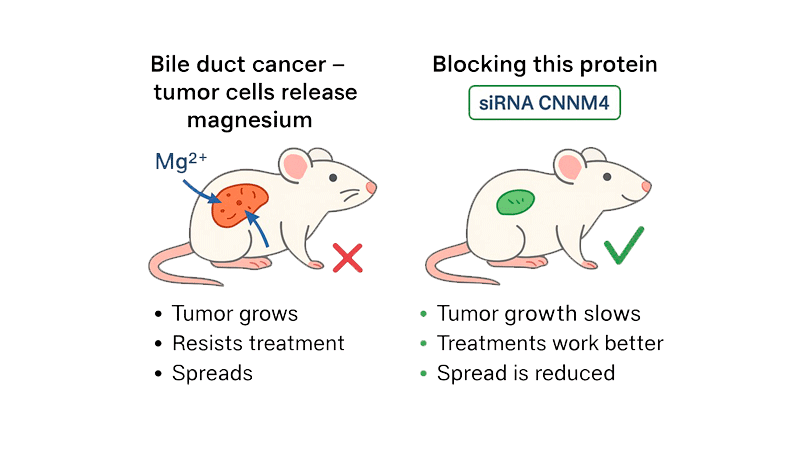
2025/09/16
New pathway to treat a rare and aggressive liver cancer: Blocking CNNM4 protein with RNA technology
An international study, published in Gut, has identified that the protein CNNM4, key in magnesium transport, is overexpressed in cholangiocarcinoma (CCA).
The findings suggest that inhibiting CNNM4, combined with GalNAc siRNA technology, could offer a targeted, safe, and effective treatment, opening new avenues for personalized therapies against this aggressive cancer.
An international study led by Dr. Malu Martínez-Chantar, principal investigator at CIC bioGUNE and CIBERehd, has identified a new therapeutic target for cholangiocarcinoma (CCA), a rare but highly aggressive liver cancer with very limited treatment options. The findings, recently published in the journal Gut, open the door to developing safe and effective personalized therapies. Importantly, the study has been highlighted with a dedicated editorial in Gut. The work was carried out with Dr. Naroa Goikoetxea and Dr. María Mercado as co–first authors, in collaboration with several international research centers.
Cholangiocarcinoma is often diagnosed late and is highly resistant to treatment. Only 20–30% of patients can undergo surgery, and survival rates remain low even after complete tumor removal. This urgent clinical challenge motivated the team to explore new strategies.
The study reveals that the protein CNNM4, responsible for transporting magnesium inside cells, is consistently overproduced in cholangiocarcinoma. By blocking CNNM4, researchers were able to slow tumor growth, reduce resistance to chemotherapy, and prevent tumor cells from spreading. Furthermore, restoring magnesium balance activated ferroptosis, a natural process that selectively eliminates cancer cells while increasing their sensitivity to treatment.
The researchers also tested GalNAc siRNA technology, which allows therapies to be delivered specifically to the liver. This precision approach could ensure treatments that are more effective, safer, and easier to administer.
“Our work not only uncovers a promising therapeutic pathway but also shows the potential of combining molecular biology with cutting-edge drug delivery technologies to move closer to personalized medicine for patients,” explains Dr. Malu Martínez-Chantar, senior author of the study.
“These results highlight how targeting a metabolic vulnerability of cancer cells can become a powerful therapeutic strategy,” adds Dr. Naroa Goikoetxea, postdoctoral researcher in the Liver Disease group at CIC bioGUNE and co–first author of the study.
This international study from CIC bioGUNE, member of BRTA, combines knowledge of tumor biology, cellular metabolism, and new therapeutic strategies, providing a significant advance in the fight against CCA, a rare but particularly aggressive cancer, and demonstrating how global scientific collaboration can generate innovative solutions for complex diseases.
The work is also part of the activities developed within the COST Action CA22125 Precision-BTC Network, further reinforcing its translational and collaborative impact. It was made possible thanks to the joint efforts of researchers at CIC bioGUNE, particularly from the Cancer Cell Signaling and Metabolism Lab and the Proteomics Platform, as well as numerous national and international institutions that have contributed decisively to this research.
Photograph by: © Figure created using Biorender.
Reference: Mercado-Gómez M, Goikoetxea-Usandizaga N, Giné AE, et al. Role of CNNM4 in the progression of cholangiocarcinoma: implications for ferroptosis and therapeutic potential. Gut. DOI: 10.1136/gutjnl-2024-333255.
About CIC bioGUNE
The Centre for Cooperative Research in Biosciences (CIC bioGUNE), member of the Basque Research & Technology Alliance (BRTA), located in the Bizkaia Technology Park, is a biomedical research organisation conducting cutting-edge research at the interface between structural, molecular and cell biology, with a particular focus on generating knowledge on the molecular bases of disease, for use in the development of new diagnostic methods and advanced therapies.
About BRTA
BRTA is an alliance of 4 collaborative research centres (CIC bioGUNE, CIC nanoGUNE, CIC biomaGUNE y CIC energiGUNE) and 13 technology centres (Azterlan, Azti, Ceit, Cidetec, Gaiker, Ideko, Ikerlan, Leartiker, Lortek, Neiker, Tecnalia, Tekniker y Vicomtech) with the main objective of developing advanced technological solutions for the Basque corporate fabric.
With the support of the Basque Government, the SPRI Group and the Provincial Councils of the three territories, the alliance seeks to promote collaboration between the research centres, strengthen the conditions to generate and transfer knowledge to companies, contributing to their competitiveness and outspreading the Basque scientific-technological capacity abroad.
BRTA has a workforce of 3,500 professionals, executes 22% of the Basque Country's R&D investment, registers an annual turnover of more than 300 million euros and generates 100 European and international patents per year.
See a large version of the first picture





